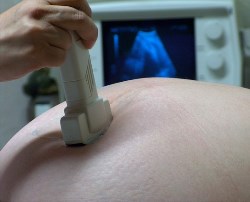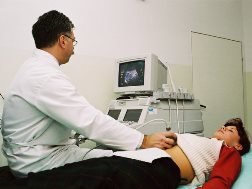How to Enroll in the Best Ultrasound Technician School near Milford Iowa
 Since you have made a decision to obtain an ultrasound technician degree near Milford IA, the next step is to start the process of selecting a college. First, you must find the right program that will provide the proper training to become a qualified professional. And given that a number of states do mandate that sonographers be either certified or licensed, depending on where you will practice you may also need preparation to pass a certification or licensing examination. So it’s very important that you investigate each college in order to assess and compare your choices. But exactly where does one start? Most individuals will begin by looking for colleges that are within travelling distance of their homes and then by comparing tuition. Certainly cost and location should be taken into account when making a decision, but there are additional critical factors also. Such as, if the ultrasound technician schools are accredited or if they offer internship programs. These and additional qualifiers will be covered more in detail later in this post. But to start with, let’s review what a sonogram tech does and the credentials and online training options that are offered.
Since you have made a decision to obtain an ultrasound technician degree near Milford IA, the next step is to start the process of selecting a college. First, you must find the right program that will provide the proper training to become a qualified professional. And given that a number of states do mandate that sonographers be either certified or licensed, depending on where you will practice you may also need preparation to pass a certification or licensing examination. So it’s very important that you investigate each college in order to assess and compare your choices. But exactly where does one start? Most individuals will begin by looking for colleges that are within travelling distance of their homes and then by comparing tuition. Certainly cost and location should be taken into account when making a decision, but there are additional critical factors also. Such as, if the ultrasound technician schools are accredited or if they offer internship programs. These and additional qualifiers will be covered more in detail later in this post. But to start with, let’s review what a sonogram tech does and the credentials and online training options that are offered.
Click Here to Get Free Information on Ultrasound Technician Schools!
Ultrasound Technician Job Description
 There are several acceptable titles for ultrasound techs (technicians). They are also called sonogram techs, diagnostic medical sonographers (or just sonographers) and ultrasound technologists. Regardless of name, they all have the same primary job description, which is to perform diagnostic ultrasound procedures on patients. Although many work as generalists there are specialties within the field, for instance in cardiology and pediatrics. Most practice in Milford IA hospitals, clinics, outpatient diagnostic imaging centers and even private practices. Standard daily job duties of an ultrasound technician may involve:
There are several acceptable titles for ultrasound techs (technicians). They are also called sonogram techs, diagnostic medical sonographers (or just sonographers) and ultrasound technologists. Regardless of name, they all have the same primary job description, which is to perform diagnostic ultrasound procedures on patients. Although many work as generalists there are specialties within the field, for instance in cardiology and pediatrics. Most practice in Milford IA hospitals, clinics, outpatient diagnostic imaging centers and even private practices. Standard daily job duties of an ultrasound technician may involve:
- Preserving records of patient medical histories and details of each procedure
- Counseling patients by explaining the procedures and answering questions
- Prepping the ultrasound machines for use and then cleaning and re-calibrating them
- Escorting patients to treatment rooms and ensuring their comfort
- Using equipment while minimizing patient exposure to sound waves
- Assessing results and identifying necessity for further testing
Ultrasound techs must routinely gauge the performance and safety of their equipment. They also are held to a high professional standard and code of conduct as medical practitioners. In order to maintain that degree of professionalism and remain up to date with medical knowledge, they are required to complete continuing education programs on a regular basis.
Ultrasound Technician Degrees Available
 Sonogram tech enrollees have the opportunity to acquire either an Associate Degree or a Bachelor’s Degree. An Associate Degree will typically involve about 18 months to 2 years to accomplish based upon the program and class load. A Bachelor’s Degree will require more time at as long as four years to finish. Another alternative for those who have already obtained a college degree is a post graduate certificate program. If you have obtained a Bachelor’s Degree in any major or an Associate Degree in a relevant medical sector, you can instead choose a certificate program that will take only 12 to 18 months to complete. One thing to keep in mind is that almost all sonographer programs do have a practical training element as part of their course of study. It can often be satisfied by participating in an internship program which numerous schools set up through Milford IA clinics and hospitals. When you have graduated from one of the certificate or degree programs, you will then have to comply with the licensing or certification prerequisites in Iowa or whichever state you elect to practice in.
Sonogram tech enrollees have the opportunity to acquire either an Associate Degree or a Bachelor’s Degree. An Associate Degree will typically involve about 18 months to 2 years to accomplish based upon the program and class load. A Bachelor’s Degree will require more time at as long as four years to finish. Another alternative for those who have already obtained a college degree is a post graduate certificate program. If you have obtained a Bachelor’s Degree in any major or an Associate Degree in a relevant medical sector, you can instead choose a certificate program that will take only 12 to 18 months to complete. One thing to keep in mind is that almost all sonographer programs do have a practical training element as part of their course of study. It can often be satisfied by participating in an internship program which numerous schools set up through Milford IA clinics and hospitals. When you have graduated from one of the certificate or degree programs, you will then have to comply with the licensing or certification prerequisites in Iowa or whichever state you elect to practice in.
Online Ultrasound Technician Schools
 As earlier discussed, virtually all ultrasound technician colleges have a clinical component to their programs. So while you can obtain a degree or certificate online, a significant part of the training will be either conducted in an on-campus lab or at an authorized off-campus facility. Practical training can often be fulfilled by means of an internship at a local Milford IA outpatient clinic, hospital or private practice. However the remainder of the training and classes can be attended online in your Milford home. This is particularly beneficial for those individuals that keep working while getting their degrees. Plus online schools are frequently less costly than on-campus options. Expenses for commuting and study materials can be reduced as well. But similarly as with any ultrasound tech college you are considering, check that the online program you choose is accredited. One of the most highly regarded accrediting organizations is the Commission on Accreditation of Allied Health Education Programs (CAAHEP). Accreditation is particularly significant for certification, licensing and job placement (more on accreditation later). So if you are dedicated enough to learn away from the classroom in the convenience of your own home, then an online degree could be the right choice for you.
As earlier discussed, virtually all ultrasound technician colleges have a clinical component to their programs. So while you can obtain a degree or certificate online, a significant part of the training will be either conducted in an on-campus lab or at an authorized off-campus facility. Practical training can often be fulfilled by means of an internship at a local Milford IA outpatient clinic, hospital or private practice. However the remainder of the training and classes can be attended online in your Milford home. This is particularly beneficial for those individuals that keep working while getting their degrees. Plus online schools are frequently less costly than on-campus options. Expenses for commuting and study materials can be reduced as well. But similarly as with any ultrasound tech college you are considering, check that the online program you choose is accredited. One of the most highly regarded accrediting organizations is the Commission on Accreditation of Allied Health Education Programs (CAAHEP). Accreditation is particularly significant for certification, licensing and job placement (more on accreditation later). So if you are dedicated enough to learn away from the classroom in the convenience of your own home, then an online degree could be the right choice for you.
Points to Ask Sonography Schools
 When you have determined which certificate or degree that you would like to earn, you can start the process of evaluating and comparing ultrasound technician schools. You will first probably want to choose whether you would rather access classes online or commute to a college campus in the Milford IA area. Certainly location will be critical if you decide on the latter, and the cost of tuition no doubt will be an initial qualification as well. But there are other variables that you must also take into account, for example if the schools are accredited and if they provide internships. Therefore in order to complete your due diligence so that you can arrive at your final selection, following are some questions that you need ask each sonography college before deciding.
When you have determined which certificate or degree that you would like to earn, you can start the process of evaluating and comparing ultrasound technician schools. You will first probably want to choose whether you would rather access classes online or commute to a college campus in the Milford IA area. Certainly location will be critical if you decide on the latter, and the cost of tuition no doubt will be an initial qualification as well. But there are other variables that you must also take into account, for example if the schools are accredited and if they provide internships. Therefore in order to complete your due diligence so that you can arrive at your final selection, following are some questions that you need ask each sonography college before deciding.
Are the Sonogram Tech Programs Accredited? The majority of ultrasound technician colleges have received some form of accreditation, whether national or regional. However, it’s still important to confirm that the school and program are accredited. One of the most highly regarded accrediting organizations in the field of sonography is the Joint Review Committee on Education in Diagnostic Medical Sonography (JRC-DMS). Schools obtaining accreditation from the JRC-DMS have gone through a detailed review of their teachers and educational materials. If the program is online it can also receive accreditation from the Distance Education and Training Council, which targets online or distance learning. All accrediting organizations should be acknowledged by the U.S. Department of Education or the Council on Higher Education Accreditation. Besides ensuring a superior education, accreditation will also assist in getting financial assistance and student loans, which are many times not accessible for non-accredited programs. Accreditation might also be a pre-requisite for certification and licensing as required. And a number of Milford IA employers will only hire a graduate of an accredited college for entry-level positions.
Are Internship Programs Provided? Ask if the sonogram technician schools you are reviewing have partnerships with Milford IA hospitals or clinics for internship programs. Not only are internships an excellent way to obtain practical experience in a clinical environment, they are additionally a way to fulfill the practical training requirement for most programs. As an ancillary benefit, they may help students and graduates develop professional relationships in the Milford medical community and help with job placement.
Is Job Placement Assistance offered? You will undoubtedly wish to secure employment quickly after graduation, but finding that initial job in a new field can be challenging without support. Find out if the sonographer schools you are interviewing have job placement programs and what their placement rates are. High and rapid placement rates are an excellent sign that the schools have substantial networks and good relationships with Iowa healthcare employers. It also confirms that their students are highly regarded and sought after.
Where is the College Located? For a number of students, the college they pick will need to be within commuting distance of their Milford IA residence. Students who have decided to attend classes online obviously will not have to trouble themselves with the location of the campus. However, the availability of area internships will be of importance. Something to consider is that if you decide to enroll in a school that is out of state or even out of your local area, you might need to pay a higher tuition. State colleges usually charge higher tuitions for out of state residents. And community colleges typically charge a higher tuition for those students that live outside of their districts.
How Large are the Classes ? Unless you are the kind of student that prefers to sit far in the back of class or get lost in the crowd, you will undoubtedly want a smaller class size. Small classes permit more individual participation and one-on-one instruction. Ask the schools you are considering what the average student to teacher ratio is for their classes. If practical you may prefer to sit in on one or more classes before making your final determination. This will also give you an opportunity to converse with a few of the instructors and students to get their perspectives regarding the sonogram technician program also.
Does the School Accommodate your Schedule? And finally you must confirm that the ultrasound tech college you finally pick can provide the class schedule you need. This is particularly essential if you decide to continue working while attending classes. If you need to schedule evening or weekend classes in the Milford IA area, make certain that they are available. If you can only enroll on a part-time basis, verify if that is an alternative and how many credit hours or courses you would have to enroll in. Also, learn what the protocol is for making up any classes that you may miss because of illness, work or family obligations.
Diagnostic Medical Sonography Schools Near Me Milford Iowa
 Picking the ideal ultrasound tech degree or certificate program is a crucial first step to initiating a rewarding new career delivering diagnostic services to patients. Ultrasound tech colleges require that you have earned a high school diploma or a GED. In addition to meeting academic requirements, you must be in at least fairly good physical condition, capable of standing for lengthy time frames and able to routinely lift weights of 50 pounds or more, as is it frequently necessary to position patients and move heavy equipment. Additional desirable talents include technical proficiency, the ability to remain collected when faced with an anxious or angry patient and the ability to communicate clearly and compassionately. You originally came to this website due to an interest in Diagnostic Medical Sonography Schools Near Me and wanting more information on Ultrasound Technician School Cost. However, as we have addressed in this post, there are multiple questions that you need to ask each college you are reviewing. This is the case whether you select an online program or commute to the school campus to attend classes. And by asking the proper questions so that you can assess each program, you can narrow down your choices until you are left with the best program for your education. And with the right training, dedication and motivation to succeed, you can accomplish your goal to practice as an ultrasound technologist in Milford IA.
Picking the ideal ultrasound tech degree or certificate program is a crucial first step to initiating a rewarding new career delivering diagnostic services to patients. Ultrasound tech colleges require that you have earned a high school diploma or a GED. In addition to meeting academic requirements, you must be in at least fairly good physical condition, capable of standing for lengthy time frames and able to routinely lift weights of 50 pounds or more, as is it frequently necessary to position patients and move heavy equipment. Additional desirable talents include technical proficiency, the ability to remain collected when faced with an anxious or angry patient and the ability to communicate clearly and compassionately. You originally came to this website due to an interest in Diagnostic Medical Sonography Schools Near Me and wanting more information on Ultrasound Technician School Cost. However, as we have addressed in this post, there are multiple questions that you need to ask each college you are reviewing. This is the case whether you select an online program or commute to the school campus to attend classes. And by asking the proper questions so that you can assess each program, you can narrow down your choices until you are left with the best program for your education. And with the right training, dedication and motivation to succeed, you can accomplish your goal to practice as an ultrasound technologist in Milford IA.
More Ultrasound Locations in Iowa
Milford, Iowa
Milford is a city in Dickinson County, Iowa, United States. The population was 2,898 at the 2010 census. The town includes many businesses related to its location in the Iowa Great Lakes region and is often referred to as the southern gateway to the Iowa Great Lakes.[4]
The Iowa Great Lakes Area was settled in the 1850s. It attracted many colonists because of the rich black soil, water from the lakes, and an abundance of wild game and fish. As the population increased at these times, there was a need for a good flouring mill because the nearest mills were those in Mankato, Minnesota and Fort Dodge, Iowa. In 1861, there was an attempt to build one on Mill Creek, at the outlet of the Great Lakes but the attempt was abandoned after the Dakota-U.S. War of 1862 and the extremely low water level that year. In 1868 one was successfully built, and sawmill was built and put into operation in 1869. The mills began to attract many customers, and the small community began to grow around Old Town. In 1870, the company that operated the mill bought a section of land northwest of Old Town and laid out a plan for the town of Milford.[5]
On March 14, 1892, the first Town Council meeting was held. Some buildings were moved from Old Town to New Town and many more businesses and residences were constructed. In 1921, the U.S. flag was flown at the new city hall for the first time and that year a vote approved to pave Okoboji Avenue (Main Street of Milford). The Milwaukee rail line which ran through Milford supplied the town with mail, groceries, clothing, lumber, coal, and machinery before automobiles could get to the Great Lakes. Two passenger trains made daily trips from Des Moines to Spirit Lake, as well as another from Spencer. Until 1910, excursion trains came to the Lakes Area from Des Moines, Algona, and other towns on weekends and holidays. The last passenger train left Milford for Spencer in 1951. The last freight train left Milford for Spencer in 1976. The tracks were dismantled in 1978[6] and later became a part of the Iowa Great Lakes Recreational Trail.
